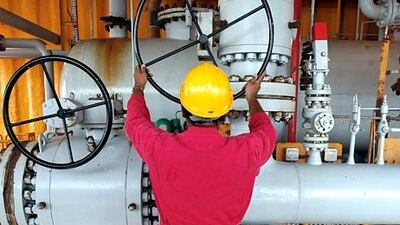Abu Dhabi fell short of meeting its target to raise oil production to 3 million barrels per day (bpd) by the end of last year, said Mohammed Al Hamli, the UAE Minister of Energy.
The UAE could also be a net importer of natural gas for some time to come, as demand for power generation and from industry continues to rise, he added.
Abu Dhabi’s oil production now stands at 2.8 million bpd for January, Mr Al Hamli said at an industry event yesterday.
In October, the minister had reiterated the emirate’s ambition to pump 3 million bpd by year-end, as part of a five-year plan to raise capacity to 3.5 million bpd.
With oil prices consistently above US$100 a barrel, increasing output is a profitable undertaking, especially given Abu Dhabi’s relatively low costs of production.
While blessed with an abundance of accessible crude – reserves are estimated at about 92 billion barrels – Abu Dhabi is having more difficulty in producing enough gas to meet domestic requirements.
“It seems like we’re going to be a net importer of natural gas since there is no way that we can meet our domestic demand from existing sources,” said Mr Al Hamli.
Gas import and export volumes in Abu Dhabi are now almost evenly matched, say energy officials.
The emirate exports natural gas it produces on its offshore fields to Japan. This leaves it short at home, and Abu Dhabi and Dubai draw on gas imported from Qatar via the Dolphin Energy pipeline.
In addition, Dubai buys liquefied natural gas (LNG) from the international markets. Abu Dhabi is set to follow suit and is building an LNG import terminal in Fujairah.
Abu Dhabi holds about 5 per cent of the world's proven reserves, but much of it is sulphur-laced sour gas, which is expensive to produce. Abu Dhabi National Oil Company (Adnoc) has responded to rapidly increasing demand by launching a major project to extract and process sour gas.
Al Hosn, a joint venture between Adnoc and the American company Occidental, will complete the Shah gas development by 2014, adding 500 million cubic feet of gas per day to the domestic supply.
Adnoc’s integrated gas development will also boost supply, while more sour-gas projects are under way.
Nevertheless, increasing demand from growing cities and industrial parks may keep the import-export balance tilted towards gas inflows.
“We are not really short of gas, but as we are looking into the deep future, unless we have some discoveries, we’re going to be a net importer,” said Mr Al Hamli.

